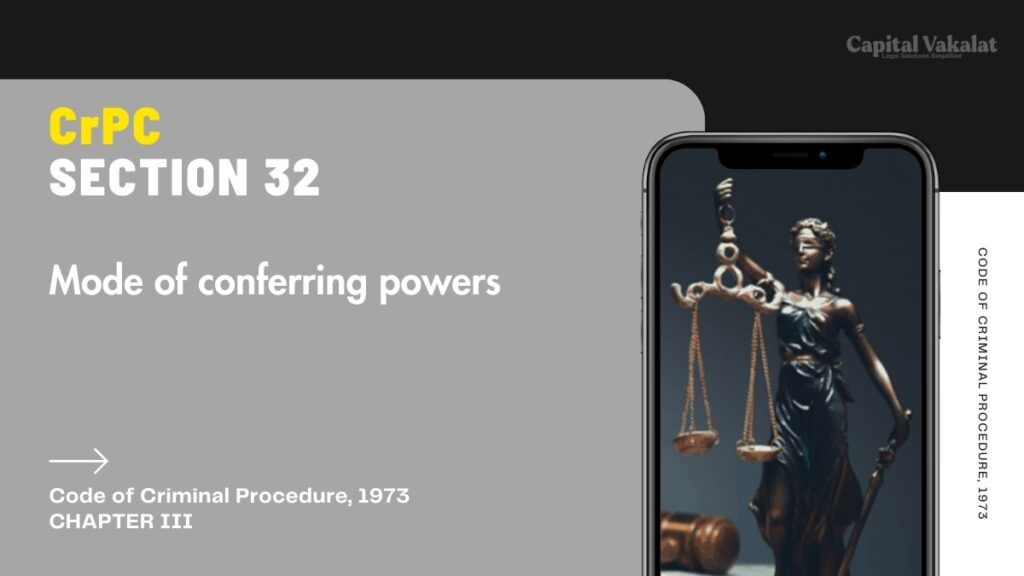The Criminal Procedure Code (CrPC) is an extensive statute that provides the detailed procedure for the administration of criminal law in India. Among its numerous provisions, Section 32 of the CrPC holds a distinctive position. This section outlines the mode of conferring powers upon the officials authorized to execute the law. Understanding the intricacies of Section 32 CrPC is crucial for law professionals, law students, and anyone interested in the judicial process.

This article aims to provide a comprehensive guide to Section 32 CrPC, exploring its various dimensions, applications, and implications within the Indian legal system.
Bare Act. Section Cr.P.C.
Mode of conferring powers.
(1) In conferring powers under this Code, the High Court or the State Government, as the case may be, may, by order, empower persons specially by name or in virtue of their offices or classes of officials generally be their official titles.
(2) Every such order shall take effect from the date on which it is communicated to the person so empowered.
Understanding Section 32 CrPC
Section 32 of the CrPC primarily deals with the delegation of powers to different authorities for the enforcement and execution of the criminal procedure code. This section is essential as it ensures that the criminal justice system operates efficiently by delegating authority to appropriate individuals and bodies.
The Importance of Delegation of Powers
Delegation of powers is a fundamental concept in administrative law, allowing higher authorities to confer specific powers to subordinate officers. In the context of Section 32 CrPC, this delegation is vital for the smooth functioning of the criminal justice system. By distributing responsibilities, the workload is managed effectively, and decisions can be made at various levels, ensuring timely justice.
Procedure Under Section 32 CrPC
The procedure for conferring powers under Section 32 CrPC involves several steps:
- Identification of Powers: The nature of the powers to be conferred is identified based on the requirements of the criminal justice system. This could include powers to arrest, investigate, prosecute, etc.
- Selection of Officials: Suitable officials are chosen based on their qualifications, experience, and competence to exercise the powers effectively.
- Formal Conferment: The powers are formally conferred through a written order, ensuring that the delegation is legally sound and enforceable.
- Notification: The conferment of powers is often notified in the official gazette to ensure transparency and accountability.
Implications of Section 32 CrPC
Section 32 CrPC has far-reaching implications for the administration of justice in India. It ensures that various functions under the CrPC are carried out by competent authorities, enhancing the overall efficiency of the criminal justice system.
Scope of Powers Under Section 32 CrPC
The scope of powers that can be conferred under Section 32 CrPC is quite broad. It includes:
- Investigative Powers: Authority to conduct investigations, collect evidence, and interrogate witnesses.
- Prosecutorial Powers: Powers to initiate and conduct prosecutions in criminal cases.
- Judicial Powers: Limited judicial powers for certain officials to make decisions on minor offenses and procedural matters.
Role of Magistrates in Section 32 CrPC
Magistrates play a crucial role under Section 32 CrPC. They are often the recipients of the delegated powers and are responsible for various judicial and administrative functions in the criminal justice process. Their decisions and actions significantly impact the administration of justice at the grassroots level.
Challenges in the Implementation of Section 32 CrPC
While Section 32 CrPC is essential for the delegation of powers, its implementation is not without challenges. These include:
- Lack of Training: Officials to whom powers are delegated may lack the necessary training and expertise, leading to inefficiency.
- Accountability Issues: Ensuring accountability and preventing misuse of delegated powers is a significant challenge.
- Resource Constraints: Limited resources can hinder the effective exercise of delegated powers.
Enhancing the Effectiveness of Section 32 CrPC
To enhance the effectiveness of Section 32 CrPC, several measures can be taken:
- Training Programs: Regular training programs for officials to whom powers are delegated.
- Monitoring Mechanisms: Establishing robust monitoring mechanisms to ensure accountability.
- Resource Allocation: Adequate allocation of resources to support the exercise of delegated powers.
Conclusion
Section 32 CrPC plays a pivotal role in the Indian criminal justice system by outlining the mode of conferring powers. This delegation is essential for the efficient functioning of the system, allowing for timely and effective administration of justice. Understanding the nuances of Section 32 CrPC is crucial for legal professionals and anyone interested in the workings of the criminal justice system. Through proper implementation and continuous improvement, the challenges associated with this section can be addressed, ensuring that justice is served efficiently and effectively.
Frequently Asked Questions
Why is the delegation of powers important under Section 32 CrPC?
The delegation of powers is important to distribute responsibilities, manage workload effectively, and ensure timely decisions within the criminal justice system.
What types of powers can be conferred under Section 32 CrPC?
Powers that can be conferred include investigative powers, prosecutorial powers, and limited judicial powers for certain officials.
What challenges are faced in the implementation of Section 32 CrPC?
Challenges include lack of training for officials, accountability issues, and resource constraints that hinder effective exercise of delegated powers.
How can the effectiveness of Section 32 CrPC be enhanced?
Effectiveness can be enhanced through regular training programs, robust monitoring mechanisms, and adequate resource allocation.
What role do magistrates play under Section 32 CrPC?
Magistrates play a crucial role as they often receive delegated powers and are responsible for various judicial and administrative functions in the criminal justice process.